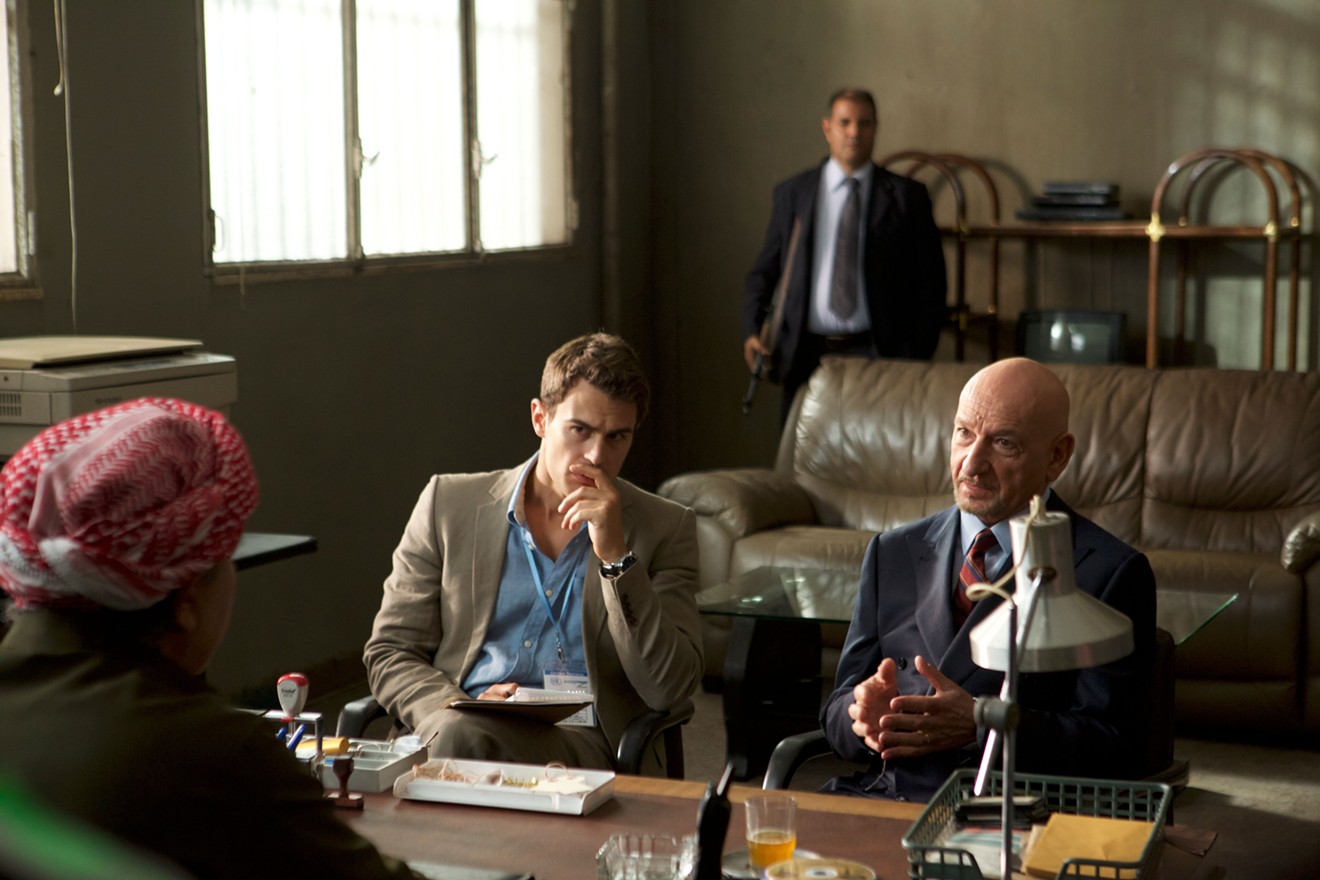The good news is that Per Fly’s Backstabbing for Beginners, a film about bad news, is not at all the cynical farce its title suggests. Instead, Fly’s dramatization of a diplomacy newbie’s true-story discovery of massive corruption in a U.N. aid program doles out lessons in principle. The hero, based on real whistleblower Michael Soussan, is played by Theo James as the kind of handsome naif who might have been shaken, in a ‘90s thriller, by the slow realization that there’s something wicked going on at the billion-dollar law firm he’s just joined. As drama, that’s not exactly satisfying: In these stories of a naif's progress, audiences are stuck a couple of steps ahead, waiting for the hero to catch up — and then for him or her to surprise us by finding a way to do what’s right.
So, it could have been called Truthtelling for Beginners. Here it’s the greed-powered wrecking ball of realpolitik that, in the story’s first half, batters the foundations of the hero’s earnestness. In 2003, not long before George W. Bush and a too-compliant news media finally got an Iraq war, Soussan was hired as a special assistant to the United Nations’ under secretary general in charge of the Oil-for-Food program that had been established to keep the citizens of Saddam Hussein’s country fed despite sanctions. There a hilarious Ben Kingsley — as Soussan’s boss Pasha – plays the role of both guide and cautionary example: Between sputtered curses, he teaches Soussan that they must put up with some corruption in Baghdad if they hope to persist in the noble cause of feeding and furnishing medicine for civilians.
The film is less a distillation of the real Soussan’s memoir than a radical simplification of it. Here, as he heads off to Baghdad for an education in institutional crookedness, Soussan tends to meet one character per geopolitical viewpoint. Pasha gets the best lines, making the case that the truth — when it comes to official reports about the program’s success — is highly subjective. A fixer, he notes, is just “the bridge between politics and reality.” He spews comic invective at the film’s margins, keeping us abreast of the big picture: “They have 100 percent fucking certainty there are WMDs in Iraq and zero percent certainty about where they are!” he barks into a phone. The film peaks with Kingsley banging a shoe at a desk as he shouts.
Soussan’s made-up-for-the-movie romance with Nashim (Belcim Bilgin), a canny Kurdish diplomat who may be a spy, seems crafted to teach him lessons about the region rather than to depict anything like life as it’s actually lived. Despite a couple of scenes of murder and kidnapping, the real suspense here is, at first, whether Soussan can come to agree with Pasha on the need to let some level of corruption persist in favor of a greater good. That thorny question becomes irrelevant after Soussan’s realization that the Oil-for-Food program is compromised not just by workaday graft and kickbacks but by Saddam Hussein and multinational corporations, who have wrung from it billions of dollars. The question becomes: What will Soussan risk to do something about it?
That question, though, is answered in the film’s opening seconds, which find Soussan taking his story to reporters at The Wall Street Journal. It’s also answered by the film’s very existence. Simply put, there’s not much suspense here, and Fly’s occasional efforts at thriller-style confrontations and killings prove less fascinating than Pasha’s justifications. Soussan’s education, meanwhile, is mostly slow and unilluminating. “It’s like Baghdad was my Casablanca,” James says in voiceover early on, cueing us to expect double-crosses, romance and agonized choices. Even the screenwriters (Fly and Daniel Pyne) seems to think that’s glib, and in one of the film’s best moments jab at that naivete: Like Humphrey Bogart’s Rick Blaine, this Soussan eventually finds himself doing the thinking for both him and his lover, making a hard choice that alters their lives. But this time, the lover, Nashim, is justifiably furious he has done so: “Who are you to decide that for me?” she rages. Attentive viewers will wonder the same thing.
[
{
"name": "Air - MediumRectangle - Inline Content - Mobile Display Size",
"component": "19274298",
"insertPoint": "2",
"requiredCountToDisplay": "2"
},{
"name": "Editor Picks",
"component": "17482312",
"insertPoint": "4",
"requiredCountToDisplay": "1"
},{
"name": "Inline Links",
"component": "18711090",
"insertPoint": "8th",
"startingPoint": 8,
"requiredCountToDisplay": "7",
"maxInsertions": 25
},{
"name": "Air - MediumRectangle - Combo - Inline Content",
"component": "17482310",
"insertPoint": "8th",
"startingPoint": 8,
"requiredCountToDisplay": "7",
"maxInsertions": 25
},{
"name": "Inline Links",
"component": "18711090",
"insertPoint": "8th",
"startingPoint": 12,
"requiredCountToDisplay": "11",
"maxInsertions": 25
},{
"name": "Air - Leaderboard Tower - Combo - Inline Content",
"component": "17482313",
"insertPoint": "8th",
"startingPoint": 12,
"requiredCountToDisplay": "11",
"maxInsertions": 25
}
]












